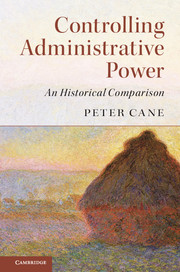Book contents
- Frontmatter
- Dedication
- Contents
- Preface
- Table of cases
- Table of legislation
- 1 Introduction: concepts and methodology
- 2 The English system of government
- 3 The US system of government
- 4 The Australian system of government
- 5 The development and institutional structure of control regimes
- 6 Administrative interpretation
- 7 Administrative fact-finding and policy-making
- 8 Administrative rule-making
- 9 Administrative adjudication
- 10 Private law controls
- 11 Controlling information
- 12 The New PublicManagement
- 13 Controlling the controllers
- 14 Concluding reflections on methodology and themes
- Bibliography
- Index
1 - Introduction: concepts and methodology
Published online by Cambridge University Press: 05 March 2016
- Frontmatter
- Dedication
- Contents
- Preface
- Table of cases
- Table of legislation
- 1 Introduction: concepts and methodology
- 2 The English system of government
- 3 The US system of government
- 4 The Australian system of government
- 5 The development and institutional structure of control regimes
- 6 Administrative interpretation
- 7 Administrative fact-finding and policy-making
- 8 Administrative rule-making
- 9 Administrative adjudication
- 10 Private law controls
- 11 Controlling information
- 12 The New PublicManagement
- 13 Controlling the controllers
- 14 Concluding reflections on methodology and themes
- Bibliography
- Index
Summary
Control regimes and systems of government
How might we explain the fact that under US administrative law, judges may be required to ‘defer’ to administrators' interpretations of statutes, whereas in both English and Australian law they must never do so? Or that the starting point of the US law of government liability is sovereign immunity whereas the starting point of Australian law is sovereign non-immunity? Or that administrative rule-making is subject to much more formal control in the United States than in either England or Australia? Or that there is no equivalent in the US of the Parliamentary Ombudsman in England or the Commonwealth Ombudsman in Australia? More generally, why do the legal regimes for controlling administrative power (‘control regimes’) in England and Australia both differ much more from that in the US than they differ from each other? On the other hand, how might we explain the fact that the freedom of information regimes in all three jurisdictions are essentially similar when those regimes differ so markedly in other areas? Or that Australian courts have rejected certain recent developments in English administrative law (such as review on proportionality grounds) when the two systems are essentially similar in many other respects. These are some of the puzzling questions with which I began the research reported in this book and which I attempt to answer in the pages that follow.
A typical lawyer's answer to such questions might be that US judges and law-makers on the one hand, and English and Australian judges and law-makers on the other, hold different normative views, based on different values, about the proper relationship between the executive and other governmental institutions, and about how best to control administrative decision-making. From this ‘ideological’ perspective, constitutional and public law theory tend to be understood as branches of, or grounded in, (normative) political theory in much the way that private law theory or criminal law theory may be understood as species of, or based on, moral theory. Putting the point crudely, in this way of thinking, the best explanation, for why the law is as it is, is that law-makers think that this is the way it ought to be.
In this book, I approach these and various other related questions in a quite different way, which might perhaps be called ‘structural’.
- Type
- Chapter
- Information
- Controlling Administrative PowerAn Historical Comparison, pp. 1 - 23Publisher: Cambridge University PressPrint publication year: 2016



